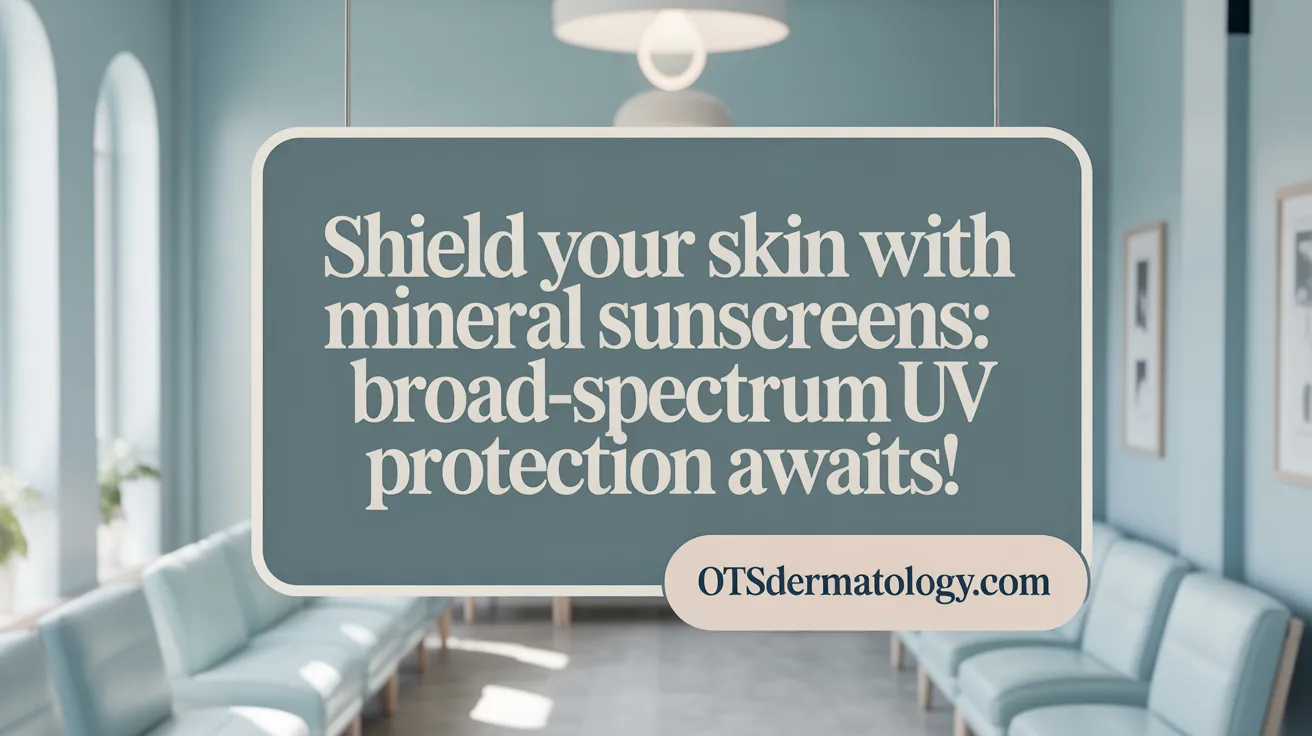Why Science Matters in Skincare
With a dazzling array of skincare products flooding the market, selecting ingredients that truly work can be overwhelming. This article distills rigorous scientific research and expert dermatologist consensus to highlight the most effective skincare ingredients backed by science. Understanding these key ingredients empowers you to build a simple, effective, and safe skincare routine that delivers real results.
Key Facts on Skin Care Ingredients
- Broad-spectrum sunscreens protect UVA and UVB rays, preventing skin aging and sunburn.
- Mineral sunscreens use zinc oxide and titanium dioxide to reflect UV radiation** without irritation.
- Daily SPF 30 reduces skin cancer risks and visible aging signs like fine lines and hyperpigmentation.
- Retinoids accelerate cell turnover and boost collagen production to reduce wrinkles, treat acne, and fade hyperpigmentation.
- Niacinamide strengthens skin barrier, reduces redness, minimizes pores, and improves skin tone.
- Hydroxy acids, AHAs and BHAs, exfoliate the skin, addressing hyperpigmentation, acne, and fine lines.
- Ceramides are lipids that restore skin barrier and help retain moisture, ideal for sensitive and dry skin.
- Hyaluronic acid is a humectant that holds 1000x its weight in water, improving hydration and skin elasticity.
- Vitamin C is a potent antioxidant that stimulates collagen and protects against UV and pollution damage.
- Peptides signal skin to produce collagen and elastin, reducing wrinkles and enhancing firmness.
1. Mineral Sunscreens: The Ultimate Shield Against UV Damage

What is Broad-Spectrum UV Protection?
Broad-spectrum sunscreens protect the skin from both UVA and UVB rays. UVA rays contribute to skin aging by breaking down collagen, while UVB rays cause sunburn. Effective broad-spectrum protection thus guards against immediate skin damage and long-term harm.
Why Use Mineral Sunscreens?
Mineral sunscreens utilize physical blockers like zinc oxide and titanium dioxide to reflect and scatter UV radiation. These ingredients are highly recommended by dermatologists for their efficacy in shielding the skin without causing irritation.
SPF Recommendations and Benefits
Daily use of broad-spectrum SPF 30 sunscreen is advised. Studies show that regular use of SPF 15 or higher reduces squamous cell carcinoma by 40% and melanoma by 50%. Higher SPF levels better protect against visible signs of aging, including fine lines, sagging, and hyperpigmentation.
Prevention of Skin Cancer and Visible Aging
Sun protection through mineral sunscreens helps prevent UV-induced DNA damage that can lead to skin cancers. In addition, consistent use slows skin aging by minimizing collagen breakdown caused by UV exposure (retinoids for cell turnover and collagen production).
Preferred Mineral Filters: Zinc Oxide and Titanium Dioxide
Zinc oxide and titanium dioxide are favored mineral filters for their broad-spectrum UV protection. Zinc oxide also helps reduce redness and wrinkles. These ingredients are safe, non-comedogenic, and suitable for sensitive skin types.
2. Retinoids: The Gold Standard for Anti-Aging and Acne

What are the types of retinoids and how are they used?
Retinoids, derivatives of vitamin A, are widely recognized for their powerful effects in skincare. They include prescription-strength tretinoin and over-the-counter (OTC) retinol. Tretinoin is the more potent option, typically prescribed for serious skin concerns, while retinol is a milder form that gradually converts into active retinoic acid within the skin, making it suitable for home use.
How do retinoids work in the skin?
Retinoids promote skin health by accelerating cell turnover and boosting collagen production. This means they encourage the shedding of old, dead skin cells and stimulate the formation of new skin cells. Increased collagen supports skin firmness and elasticity, reducing the appearance of wrinkles and fine lines (source).
What skin concerns do retinoids address effectively?
Retinoids have robust evidence supporting their efficacy:
- Wrinkles and fine lines: By stimulating collagen synthesis and enhancing skin renewal (source).
- Acne: Retinoids unclog pores and normalize skin cell shedding, reducing breakouts (source).
- Hyperpigmentation: They fade dark spots by promoting even skin tone through increased cell turnover (source).
- Large pores and oily skin: Retinoids minimize pores and help regulate sebum production (source.
What are the recommendations and safety considerations?
It is advised to use retinoids gradually to minimize irritation, starting with lower concentrations such as retinol at 0.5–1% and increasing as tolerated. Daily application of broad-spectrum sunscreen with SPF 30 or higher is essential, as retinoids can increase photosensitivity. Pregnant or breastfeeding women should avoid retinoids due to safety concerns. Consulting a dermatologist can guide safe and effective use tailored to individual skin needs (source.
3. Niacinamide: The Versatile Vitamin B3 Wonder

What Makes Niacinamide Essential for Skin Health?
Niacinamide, also known as vitamin B3, is a powerhouse skincare ingredient renowned for its multifaceted benefits. It plays a crucial role in strengthening the skin’s barrier, which is essential for protecting against environmental aggressors and retaining moisture. By fortifying this barrier, niacinamide helps maintain skin hydration and resilience.
How Does Niacinamide Combat Inflammation and Redness?
One of the notable benefits of niacinamide is its anti-inflammatory properties, making it effective for calming irritated and sensitive skin. It reduces redness, which is particularly beneficial for conditions like rosacea and general skin sensitivity. This calming effect supports a more even and balanced complexion.
Can Niacinamide Minimize Pores and Regulate Oil?
Niacinamide helps minimize the appearance of enlarged pores and regulates sebum production, which is instrumental in managing oily skin types. By controlling excess oil and reducing pore size, it contributes to clearer, smoother skin and helps reduce acne flare-ups.
What Impact Does Niacinamide Have on Hyperpigmentation?
Beyond its barrier-strengthening effects, niacinamide is effective in improving hyperpigmentation. It works by inhibiting the transfer of melanin to skin cells, gradually fading dark spots and uneven skin tone. This makes it a valuable ingredient for brightening and evening out the complexion.
What Does Research Say About Niacinamide's Efficacy?
Clinical trials support the use of niacinamide at concentrations around 5%, which have shown significant improvements in skin texture, tone, and overall appearance within 8 to 12 weeks. These studies confirm its safety and effectiveness for a wide range of skin concerns.
In summary, niacinamide is a versatile and scientifically validated skincare ingredient known for enhancing skin barrier function, reducing inflammation and redness, controlling oil production, and improving pigmentation issues. Its gentle yet powerful nature makes it suitable for diverse skin types and concerns.
4. Hydroxy Acids: Effective Exfoliants for Radiant Skin

What are Alpha Hydroxy Acids (AHAs) and Beta Hydroxy Acids (BHAs)?
Alpha Hydroxy Acids (AHAs) such as glycolic acid and lactic acid are water-soluble acids derived from natural sources like sugarcane and milk. They work primarily on the skin’s surface to gently exfoliate by loosening the bonds between dead skin cells. Beta Hydroxy Acids (BHAs), including salicylic acid and its derivative Lipo-Hydroxy Acid (LHA), are oil-soluble, enabling them to penetrate pores deeply.
How do hydroxy acids exfoliate and improve skin texture?
AHAs promote the shedding of the outermost layer of dead skin, resulting in a smoother, brighter texture and reduced hyperpigmentation. BHAs penetrate oily pores, dissolving excess sebum and dead cells, which helps clear acne and reduces pore congestion. LHA offers similar pore-clearing benefits with less irritation and additionally stimulates collagen production, aiding in skin firmness.
What are the applications of these acids in skincare?
- Acne: BHAs like salicylic acid excel at treating acne by clearing pores and soothing inflammation.
- Hyperpigmentation: AHAs improve uneven tone by speeding up cell turnover and fading dark spots.
- Wrinkles: Regular AHA use can diminish fine lines by encouraging skin renewal and boosting collagen.
Together, these acids provide effective exfoliation that reveals radiant, smoother skin while addressing multiple skin concerns.
5. Ceramides: Essential Lipids for Skin Barrier Restoration

What role do ceramides play in restoring and maintaining the skin barrier?
Ceramides are naturally occurring lipids that form a crucial part of the skin’s protective barrier. They help to restore and maintain this barrier by filling in the spaces between skin cells, which keeps the skin strong and resilient against environmental aggressors such as pollution and irritants. By reinforcing the skin barrier, ceramides prevent water loss and protect the skin from damage. For more on Ceramides for Skin Barrier Restoration and their role in Skin Barrier Protection.
How do ceramides benefit moisture retention?
Ceramides have excellent moisture retention properties. They lock in hydration by forming a protective layer on the skin's surface, which reduces transepidermal water loss (the process where water escapes from the deeper layers of skin). This moisture-locking ability helps the skin stay hydrated, plump, and healthy, improving overall skin texture and softness. Learn about Ceramides for Skin Hydration and their Moisturizing Properties.
Why are ceramides important for dry and eczema-prone skin?
Individuals with dry or eczema-prone skin often have a compromised skin barrier that allows moisture to escape and irritants to penetrate the skin easily. Using ceramide-containing skincare products helps to repair this weakened barrier, restoring skin hydration and reducing dryness and irritation. Ceramides are clinically recognized as beneficial in soothing and improving skin conditions marked by barrier dysfunction, such as eczema. More details on Ceramides for Eczema and Dry Skin and their Role in Skin Hydration and Protection.
What scientific evidence supports the use of ceramides in skincare?
Clinical studies have demonstrated that topical ceramide formulations effectively restore the skin barrier and improve skin hydration. Research has shown that ceramides increase skin moisture, reduce dryness, and improve symptoms of barrier-related skin disorders. Consequently, ceramides are widely recommended by dermatologists and included in many moisturizers designed for dry, sensitive, or damaged skin. For evidence-based insights, see Ceramides in Evidence-Based Skincare and Dermatologist Recommendations.
In summary, ceramides are essential skincare ingredients backed by scientific research, known for their barrier-restorative and moisture-retentive properties, making them particularly valuable for dry and eczema-prone skin.
6. Hyaluronic Acid: The Super Hydrator for Plump Skin

What is the hydration mechanism of hyaluronic acid?
Hyaluronic acid is a powerful natural humectant capable of holding up to 1,000 times its weight in water. When applied to damp skin, it attracts and retains moisture in the skin's surface layers, helping keep skin hydrated and plump. This intense water-binding ability aids in preserving the skin's moisture balance, making it a superior hydrating ingredient.
How does hyaluronic acid affect fine lines and skin elasticity?
By maintaining optimal hydration, hyaluronic acid helps reduce the appearance of fine lines caused by skin dryness. Well-hydrated skin looks smoother and more supple. It also contributes to improving skin elasticity by supporting the skin’s extracellular matrix, which provides structural support and resilience to skin (collagen and skin firmness).
Is hyaluronic acid suitable for all skin types?
Yes, hyaluronic acid is gentle and effective for all skin types, including sensitive, oily, and dry skin. Its lightweight nature ensures it hydrates without clogging pores or causing irritation, making it a versatile option in skincare routines (dermatologist recommended skin care.
How do molecular sizes affect penetration of hyaluronic acid?
Hyaluronic acid molecules vary in size, which influences their skin penetration abilities. High molecular weight forms hydrate the skin’s surface and form a protective film, while low molecular weight forms penetrate deeper layers to boost hydration internally and stimulate collagen (Hyaluronic acid deep hydration).
Understanding these mechanisms allows for better formulation choices to maximize hyaluronic acid's benefits in skincare products.
7. Vitamin C: Antioxidant Powerhouse for Brightening and Protection

What Are the Antioxidant Properties of Vitamin C?
Vitamin C is a potent antioxidant known for neutralizing free radicals generated by UV rays, pollution, and other environmental stressors. By reducing oxidative stress in the skin, it helps prevent premature aging and damage at the cellular level. See more on the Vitamin C antioxidant effects and Vitamin C Benefits for Skin.
How Does Vitamin C Stimulate Collagen Synthesis?
Vitamin C plays a critical role in boosting collagen production by supporting the enzymes responsible for collagen molecule formation. This stimulation helps improve skin firmness, reduce wrinkles, and repair damage, promoting a youthful complexion. Learn about Vitamin C and collagen production and its collagen synthesis support.
How Does Vitamin C Protect the Skin Against UV and Pollution Damage?
By scavenging harmful free radicals and bolstering the skin's defenses, Vitamin C offers protection against damage from UV radiation and environmental pollutants. While it is not a substitute for sunscreen, it complements UV protection by preventing collagen breakdown and reducing pigmentation caused by sun exposure. Information on Vitamin C antioxidant properties and its role alongside Broad-Spectrum Sunscreen Ingredients is available.
What Are the Forms and Stability Challenges of Vitamin C in Formulations?
Vitamin C is commonly used as L-ascorbic acid or as more stable derivatives like ascorbyl palmitate and magnesium ascorbyl phosphate. However, pure vitamin C is unstable and can degrade quickly when exposed to air and light. Effective formulations require precise pH and packaging to maintain its potency and ensure skin absorption. Detailed insights on Vitamin C forms and stability challenges can be found.
Using Vitamin C in skincare demands careful formulation to maximize its benefits for brightening skin, fading dark spots, and protecting against environmental damage, making it an essential ingredient in many anti-aging and corrective skin treatments. For expert advice on Vitamin C in skincare and evidence-based skincare ingredients, see the recommended sources.
8. Peptides: Building Blocks to Boost Collagen and Firmness

What role do peptides play in collagen and elastin production?
Peptides are short chains of amino acids that serve as signals to the skin, prompting cells to produce more collagen and elastin. These proteins are crucial for maintaining skin's firmness and elasticity. By encouraging the skin to repair and regenerate, peptides support the structural integrity of the skin, helping it maintain a youthful appearance. For more information, see Peptides for collagen and elastin.
How do peptides benefit the skin in terms of wrinkles and elasticity?
Peptides help reduce the appearance of fine lines and wrinkles by stimulating collagen synthesis, which thickens and firms the skin. This improved skin firmness also enhances elasticity, allowing skin to better resist sagging and maintain its shape. Over time, regular use of peptide-containing products can lead to smoother, more resilient skin. Learn more about Peptides for collagen production and their role in anti-aging skin care.
What scientific evidence supports the effectiveness of peptides, and how does formulation impact their benefits?
Scientific studies have shown that peptides can promote collagen and elastin production, acting as antioxidants and aiding in tissue repair. However, the benefits of peptides depend significantly on how skincare products are formulated. Proper formulation ensures peptide stability and skin penetration, which are critical for their effectiveness. Without careful formulation, peptides may not deliver their full potential benefits. For evidence-based insights on peptides and skincare formulation, see resources on scientifically validated skincare ingredients and best practices for using actives safely.
9. Azelaic Acid: Anti-Inflammatory Solution for Acne and Rosacea
What are the anti-inflammatory effects of azelaic acid?
Azelaic acid is recognized for its anti-inflammatory properties which help reduce redness and irritation in the skin. This makes it beneficial for treating inflammatory skin conditions like acne and rosacea by calming the skin and reducing swelling.
How effective is azelaic acid in treating acne and rosacea?
Clinical studies show that azelaic acid effectively treats acne by reducing the proliferation of acne-causing bacteria and unclogging pores. It also improves rosacea symptoms by controlling inflammation and soothing affected areas, making it a reliable treatment for these common skin concerns. (For more, see: Azelaic acid for acne and rosacea)
What are the availability options for azelaic acid in skincare products?
Azelaic acid is available in both prescription and over-the-counter (OTC) products. Prescription formulations typically contain up to 15% azelaic acid for stronger effects, whereas OTC products commonly have concentrations below 10%, suitable for milder treatment or maintenance. (Azelaic acid for acne and rosacea)
Does azelaic acid provide any additional skin benefits?
Besides its anti-inflammatory role, azelaic acid also acts as a skin brightener. It inhibits melanin production, which helps in reducing dark spots and uneven pigmentation, contributing to an overall more even skin tone. See also: Dark spot treatment ingredients
10. Hydroquinone and Kojic Acid: Targeting Hyperpigmentation Safely
How do hydroquinone and kojic acid reduce melanin production?
Hydroquinone and kojic acid are two potent ingredients commonly used to treat hyperpigmentation by targeting melanin, the pigment responsible for skin color. Hydroquinone works by inhibiting the enzyme tyrosinase, which is crucial for melanin synthesis. This decreases melanin formation, leading to lighter skin patches over time. Kojic acid, derived from fungi, similarly suppresses tyrosinase activity, providing a natural alternative to hydroquinone (Hydroquinone for dark spots, Kojic acid usage.
Why is hydroquinone the dermatologist-preferred bleaching agent?
Hydroquinone holds the highest approval rate from dermatologists, with around 98.4% endorsing its effectiveness for lightening dark spots and uneven pigmentation. It is considered the gold standard due to its powerful pigment-inhibiting capabilities and rapid visible results, especially in concentrations prescribed by doctors (Hydroquinone for dark spots, Hydroquinone skin-lightening agent.
What makes kojic acid a valuable alternative?
Kojic acid is favored as a gentler alternative derived from natural sources, offering effective skin-brightening properties with fewer side effects compared to hydroquinone. It also provides some degree of UV protection, which aids in preventing further pigmentation (Kojic acid for hyperpigmentation, Kojic acid usage, Natural skin care ingredients).
What are the risks and recommendations for safe use?
Hydroquinone usage may cause irritation, allergic reactions, and increased sensitivity to sunlight, so it should be used under medical supervision, especially for prolonged periods. Kojic acid, while milder, can also cause sensitivity or irritation for some individuals. Both ingredients require careful use, including applying sunscreen daily (Importance of broad-spectrum SPF 30 sunscreen, Sunscreen for skin protection) and limiting exposure duration to minimize risks. Consulting a dermatologist is recommended to tailor treatment safely and effectively (Dermatologist recommended skin care).
Building an Effective Skincare Routine with Science-Backed Ingredients
Scientific research and dermatological consensus highlight that a limited number of skincare ingredients stand out for their proven benefits and safety profiles. Incorporating mineral sunscreens, retinoids, niacinamide, hydroxy acids, ceramides, hyaluronic acid, vitamin C, peptides, azelaic acid, and safe hyperpigmentation treatments into your skincare can effectively address concerns like aging, acne, dryness, and discoloration while protecting and restoring your skin. Prioritizing these power ingredients within a simple cleansing, moisturizing, and sun protection routine optimizes skin health and beauty backed by science.
